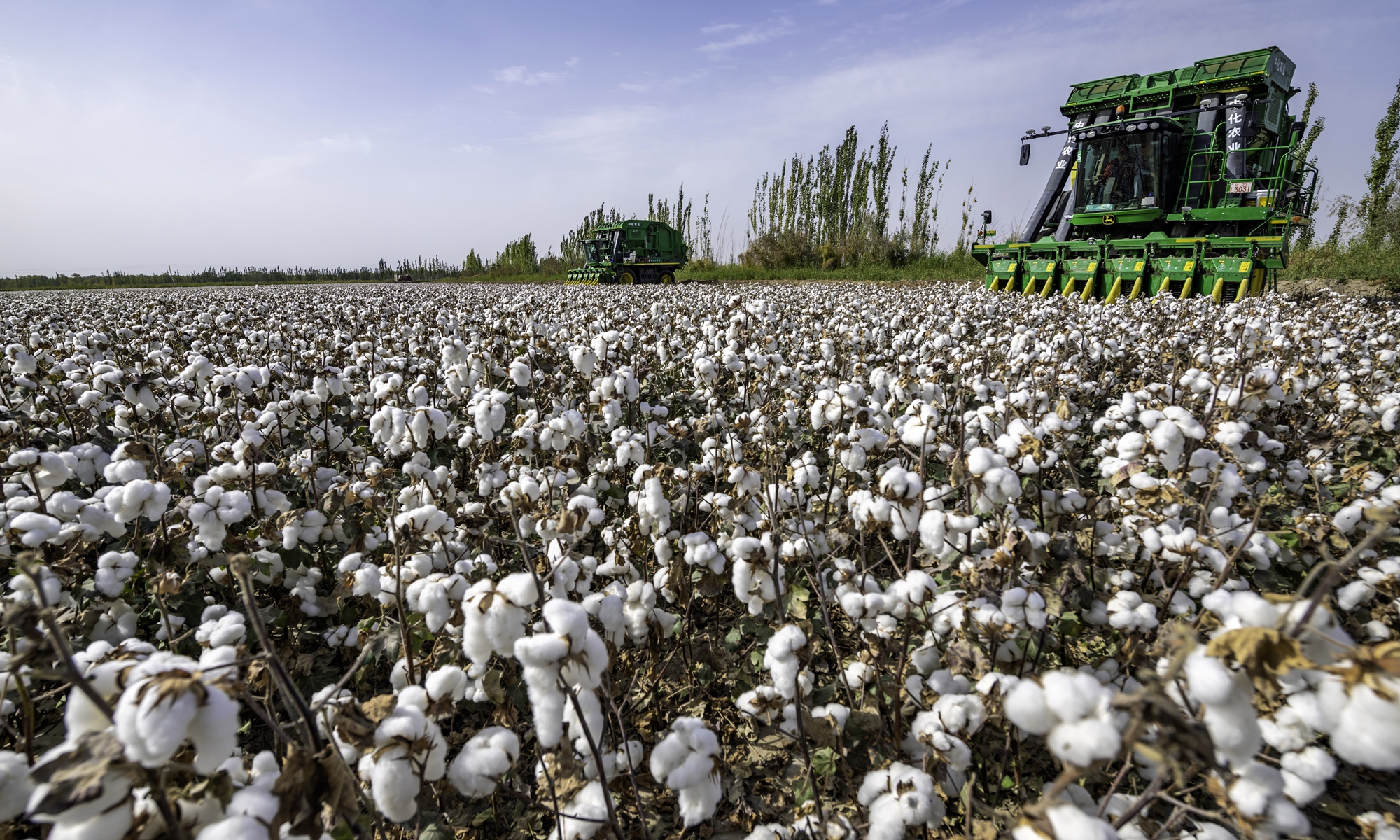
In a cotton-producing village in Bayingolin Mongolian Autonomous Prefecture, Northwest China's Xinjiang Uygur Autonomous Region, large-scale machines operate at full capacity to seize the harvest season on September 28, 2020. The total cotton plantation area in Xinjiang reached 24.19 million mu (1.6 million hectares) and around 16.90 million mu were harvested by machines in 2020, accounting for 70 percent of the plantation area. Photo: VCG
The Canadian Broadcasting Corporation reported on Sunday that UN Secretary General Antonio Guterres said in an interview that the UN is holding "serious negotiations" with China about granting UN human rights high commissioners access to Northwest China's Xinjiang Uygur Autonomous Region "without restrictions or limitations."
It is hoped that the visit "without restrictions or limitations," mentioned by Guterres, is a normal international visit rather than a visit for the so-called freedom of investigation with the presumption of guilt required by the US and Europe. For the moment, a sharp confrontation on Xinjiang-related issues has been taking shape.
We understand the political difficulties that the UN is being confronted with when intervening in the case. But it is the expectation of the international community that the UN can withstand Western pressure and abide by the spirit of the Charter of the United Nations.
China has always welcomed foreign diplomats and journalists to Xinjiang to carry out relevant reports. Xinjiang has also received many of them. The interaction has improved the outside world's understanding of the real situation in the autonomous region. But some Western countries have formed a severe prejudice toward Xinjiang affairs. They tend to imperiously turn related visits into investigations on the alleged human rights violations in Xinjiang and demand China give the green light to their attempts to infringe on China's sovereignty, which will likely jeopardize Xinjiang's stability. This is something China will never accept.
For example, when the EU planned to send a delegation to Xinjiang, it requested to meet separatist Ilham Tohti, who is serving his prison term. The request shows EU's lack of basic respect for China's sovereignty and was surely rejected by the Chinese side. Some Chinese laughed at the EU's attempt and asked, do they think they still live 120 years ago?
When foreign visitors come to Xinjiang, they can visit various places, walk through villages and alleys, come into contacts with people working on production lines and places of consumption. They will witness both the daily and religious life of Xinjiang people. What is Xinjiang like? Could the answer be possibly concealed in such a wide range of observations? Xinjiang is not a giant film studio and it is impossible to rehearse 25 million people there to perform in front of a few foreigners. The US and European elites should not humiliate the judgment of a normal visiting group.
But we cannot let anyone deeply hostile toward Xinjiang set foot on the land. We no longer believe they have basic political and moral ethics to objectively describe Xinjiang. They have portrayed poverty alleviation efforts as a way of "forced labor." Is it still worth talking to them? The only thing we can do is to confront them until we defeat them.
Today, Xinjiang is neither a hell nor a paradise. It is a place which has just gotten rid of severe terrorism and extremism, and is heading toward peace and prosperity. There are not only achievements, but also some practical problems there. But the general trend is heading for a much better future. People of all ethnic groups are benefitting from the great changes taking place in Xinjiang. This is clear. Anyone who comes to visit without bias will have such cognition.
The big lie that cotton in Xinjiang is produced through "forced labor" does not stand up to the on-site inspections. As up to 75 percent of Xinjiang's cotton is harvested by machine, Xinjiang is quickly becoming one of the most advanced cotton-producing regions in the world. So where is the room for "forced labor?" Does the US smear Xinjiang because its own prosperity was achieved by slave labor and because there are still many forced laborers in the US today?
The accusations the US and Europe have made against Xinjiang can be argued as imaginations and fabrications based on what they themselves have actually done. The difference between socialist China and those countries is like the difference between a gentleman and a villain. Making comparison with those countries is an insult to China.
Anyone who visits Xinjiang will receive unrestricted treatment under international norms, and they will certainly be able to see the real Xinjiang with their own eyes. It is a disgrace for modern Western public opinion to demonize China and fabricate Xinjiang as a place filled with persecution and falsehood. It is hoped that the UN, for its part, will not be influenced by pressure from the West, will hold fast to the common morality of humanity and contribute to providing the world the truth, and clear Xinjiang's name.




